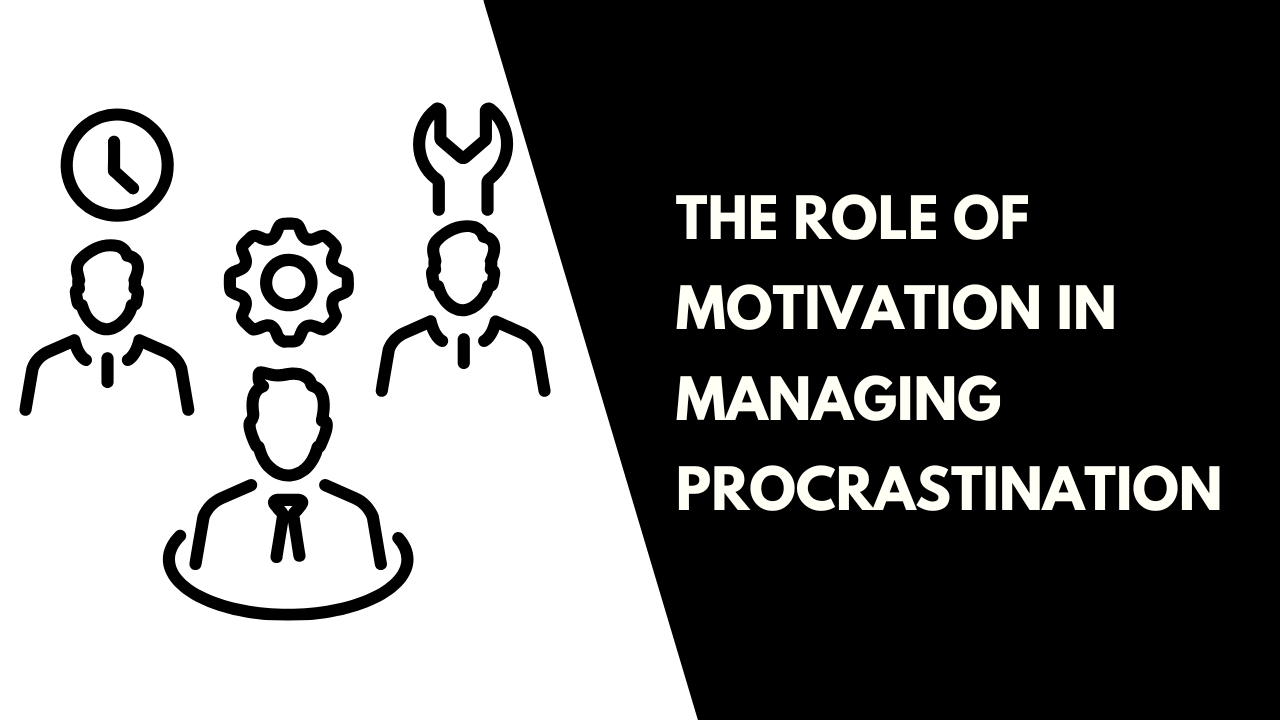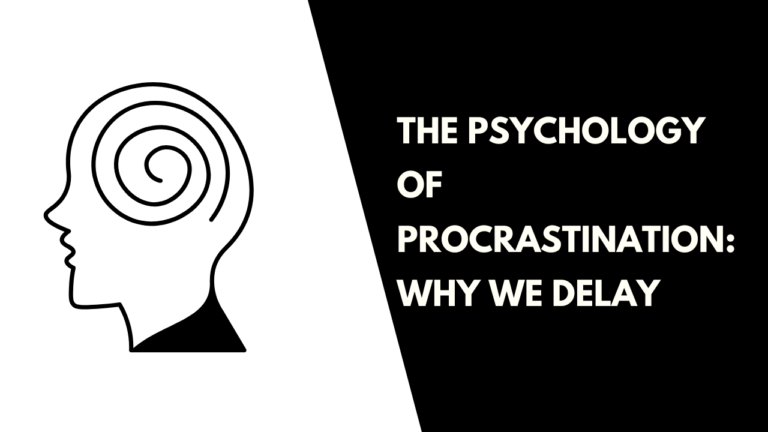The Role of Motivation in Managing Procrastination
The Role of Motivation in Managing Procrastination
Procrastination is a struggle most of us know too well. We delay tasks, convince ourselves there’s still time, and end up scrambling at the last minute. Whether it’s an unfinished project, a pending assignment, or a fitness goal pushed aside for “tomorrow,” procrastination robs us of time, productivity, and peace of mind.
Table of Contents
ToggleBut why do we procrastinate? And more importantly, how can we stop procrastinating? The answer often lies in motivation—that inner drive that pushes us to act. In this post, we’ll explore the role of motivation in managing procrastination, why we lose motivation, and how to cultivate it effectively.
Why Do We Procrastinate?
Before tackling managing procrastination, we must understand why we procrastinate in the first place. Contrary to popular belief, procrastination isn’t always about laziness. It often stems from:
- Fear of Failure – The pressure to perform perfectly can be paralyzing.
- Lack of Interest – If a task isn’t engaging, it’s easy to postpone.
- Overwhelming Tasks – Large projects can feel daunting, making avoidance tempting.
- Lack of Clear Goals – Without direction, it’s easy to drift into procrastination.
- Instant Gratification – Social media, TV, and other distractions offer quick pleasure, making long-term tasks less appealing.
While these reasons vary, a common underlying factor is low motivation. Without the right motivation, even the most important tasks remain untouched.
How Motivation Helps in Managing Procrastination
Motivation plays a crucial role in managing procrastination. When motivated, we feel energized, focused, and committed to completing tasks. Let’s break down how motivation can help us stop procrastinating.
1. Motivation Turns Tasks into Challenges Instead of Burdens
Have you noticed how some people thrive under pressure, while others crumble? The difference often lies in how they perceive tasks. Highly motivated individuals see challenges as opportunities rather than burdens.
Example:
Rohan, a marketing professional, was assigned a major presentation at work. He dreaded public speaking and kept delaying the preparation. But when he shifted his mindset—viewing the presentation as a chance to showcase his expertise rather than a potential failure—he felt a surge of motivation. He practiced daily, refined his slides, and ultimately delivered an impressive presentation.
Takeaway:
When struggling with procrastination, reframe the task. Instead of thinking, “I have to do this,” tell yourself, “I get to do this.” Finding purpose in your work fuels motivation.
2. Intrinsic vs. Extrinsic Motivation: Finding What Works for You
Motivation comes in two forms:
- Intrinsic Motivation – Comes from within. You do something because you find it meaningful.
- Extrinsic Motivation – Comes from external rewards like money, recognition, or fear of consequences.
Both forms can be powerful in managing procrastination, but intrinsic motivation is more sustainable.
Example:
Anisha, a college student, struggled with studying. She lacked motivation until she realized her dream of becoming a psychologist. Once she connected her daily studies to her long-term goal, studying no longer felt like a burden—it became a stepping stone.
Takeaway:
Find your why. If a task feels pointless, ask yourself:
“How does this contribute to my bigger goal?” Connecting work to personal aspirations boosts motivation.
3. The Power of Small Wins: Building Momentum
One of the most effective ways to stop procrastinating is by celebrating small wins. Motivation isn’t always about a giant burst of energy—it’s often built through small successes.
Example:
Rahul wanted to write a book but kept postponing it because the task felt overwhelming. Instead of waiting for the perfect time, he set a goal to write just 200 words a day. Within a few months, his book was nearly finished—all because he focused on small, consistent progress.
Takeaway:
Break tasks into smaller steps. Completing tiny milestones boosts confidence and motivation.
4. Creating a Motivating Environment
Your environment influences your motivation in managing procrastination more than you realize. A cluttered desk, constant notifications, and unstructured routines kill motivation.
Example:
Sara, a freelance writer, struggled to meet deadlines. She transformed her workspace into a distraction-free zone, set fixed work hours, and followed the Pomodoro technique (25-minute work sprints with breaks). Within weeks, she noticed a dramatic improvement in productivity.
Takeaway:
Design your environment for success. Remove distractions, organize your workspace, and set specific work hours.
5. Using Accountability to Stay Motivated
When motivation wanes, accountability helps keep procrastination at bay. Having someone to check on your progress makes you more likely to follow through.
Example:
Amit and his friend decided to hit the gym together. On days when one felt lazy, the other provided motivation. Their accountability partnership helped them stay consistent and achieve fitness goals.
Takeaway:
Share your goals with a friend, mentor, or coach. Public commitment increases motivation and reduces procrastination.
6. Rewarding Yourself for Progress
Rewarding yourself for progress—big or small—reinforces motivation. Knowing there’s a reward at the finish line can make tasks more enjoyable.
Example:
Megha struggled with writing reports. She decided to treat herself to her favorite coffee after completing each section. This small incentive kept her motivated.
Takeaway:
Set reward systems to boost motivation. It can be as simple as a break, a favorite snack, or a fun activity after completing a task.
Practical Steps to Boost Motivation & Stop Procrastinating
Now that we understand the role of motivation in managing procrastination, here are actionable steps to implement:
✅ Set Clear Goals: Define what needs to be done and why it matters.
✅ Break Tasks into Small Steps: Avoid overwhelm by taking it one step at a time.
✅ Create a Motivating Environment: Declutter, eliminate distractions, and set up a productive workspace.
✅ Use Accountability: Find a study buddy, mentor, or join a group with similar goals.
✅ Celebrate Progress: Reward yourself for small achievements to keep motivation high.
✅ Visualize Success: Imagine the satisfaction of completing the task—this fuels motivation.
✅ Start with a 5-Minute Rule: If a task feels difficult, commit to working on it for just 5 minutes. Often, you’ll end up doing more.
Final Thoughts: Motivation is the Key to Managing Procrastination
Procrastination isn’t just about laziness—it’s about motivation. By understanding what drives us, reframing tasks, and using small rewards, we can develop the motivation needed to stop procrastinating and take control of our time.
The key is to start. Motivation builds momentum, and momentum leads to action. So, what’s one task you’ve been delaying? Use these strategies, take the first step today, and reclaim your productivity!
“Stop postponing your dreams! From Delay to Done is your ultimate guide to conquering procrastination. Grab your copy today on Amazon!







